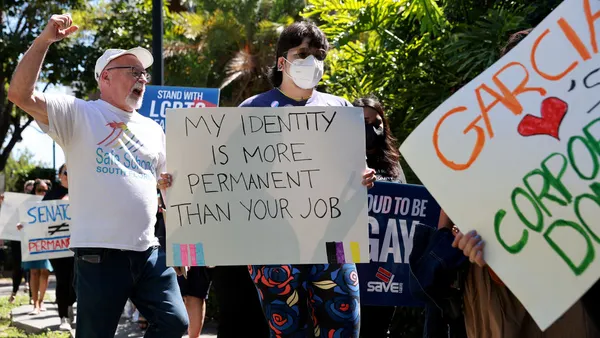Last week, Massachusetts passed the most robust equal pay law in the nation — and it likely won't be the last the industry hears of such laws.
While equal pay laws are already on the books in many states, these bills tend to "lack teeth" and end up protecting employees in only a narrow way. But that may be beginning to shift. Other states have already attempted to strengthen their pay laws, including California, which — prior to the new Massachusetts law — had the "most aggressive" fair pay law in the country.
Both California and Massachusetts' laws broaden "comparable work" or "substantially similar work" protections, a trend that will likely continue in the coming year.
"I think very few businesses consciously discriminate, but they need to become aware of it," said State Senator Pat Jehlen, a Democrat and one of the bill's co-sponsors, in a New York Times report. "These are things that don't just affect one job; it keeps women's wages down over their entire lifetime."
HR Dive spoke to Amanda Baer, a member of Mirick O'Connell's Labor, Employment and Employee Benefits Group, to figure out what's changing and what that means for HR professionals nationwide.
What has changed?
The Massachusetts law has a strong combination of both substantive and procedural changes, Baer said. The old law had a "comparable work" clause that helped courts determine if employees of different genders were being paid unequally for similar work, but the Massachusetts court had interpreted it fairly narrowly. This new law brings a more broad interpretation to the clause, she said, and supersedes the court's old interpretation, meaning it will have more application.
Procedurally, the old law required employees to file with the Massachusetts Commission Against Discrimination with a statute of limitations of 300 days. The new law allows employees to go straight to court, with a statute of three years.
However, the change garnering most attention is that employers are no longer allowed to ask about past salary, Baer said. Instead, a manager must put a compensation figure upfront, "based on what an applicant's worth is to the company, rather than on what he or she made in a previous position," the New York Times reports. Such provisions are to help ensure that any past discrimination made at other companies does not follow applicants their entire careers.
Applicants are allowed to volunteer their salary history under the law, and employers are still allowed to ask about a desired salary range.
What will HR need to do?
The law goes into effect Jan. 1, 2018. Baer said that HR will need to keep track of three main concerns:
- Revise any applications to remove questions about pay history.
- Retrain hiring managers and recruiters not to ask about pay history – an important point, as this is "very commonplace," Baer said.
- The law also strongly suggests that employers complete self-audits on their pay programs every three years, Baer said. She advises completing an audit prior to the Jan. 2018 deadline.
Do employer groups like it?
Employer advocacy groups gave input that was worked into the legislation, Baer said, and noted that so far she had not heard of any backlash against the provision.
"The only argument I've heard [for asking about pay] that has any bit of credibility is that it saves recruiters time," Brian Kropp, the human resources practice leader at advisory firm CEB, told the Washington Post. In the same article, he calls the law "unambiguously a good thing."
"The law is definitely more robust," Baer said. "The definition of comparable is broad, and it has all these new protections that no other states have."
Will it spread?
Baer said she believes that such laws will "absolutely" spread.
"Massachusetts has been a leader in legislation like same-sex marriage rights and healthcare," she said. "I see this law spreading to other states."
Additionally, this law may be broadened to protect against discrimination for other classes, including racial pay discrimination. Employers will want to keep track of the law, especially since penalties "can really add up," she said. An employee who is not paid equally will be entitled to back pay and all damages — which can amount to quite a bit.
The real question: Will companies seek to standardize equal pay policies across the nation to match the Massachusetts law? Kropp told the Washington Post that it is likely: "A lot of [companies] are going to say we don't want the complexity."











